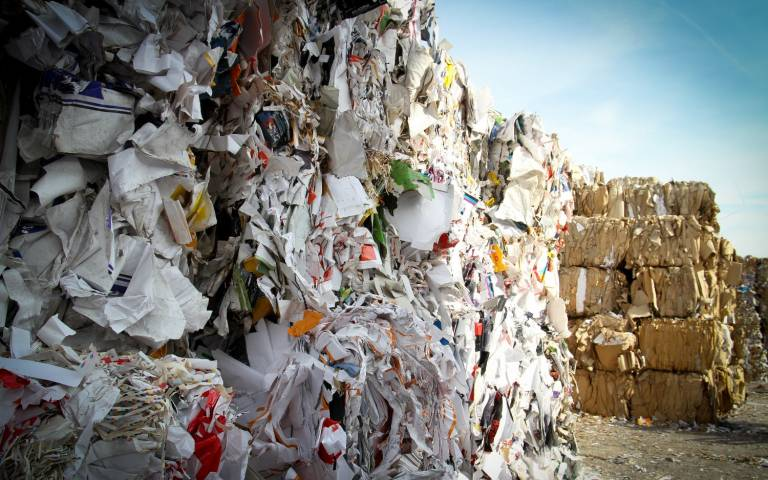Oct 20 2020
A new modeling study by researchers at University College London (UCL) and Yale University shows that recycling paper might be useful to the climate only if it is driven by renewable energy.
 A paper waste recycling plant in Rotterdam, the Netherlands. Image Credit: Bas Emmen from Unsplash.
A paper waste recycling plant in Rotterdam, the Netherlands. Image Credit: Bas Emmen from Unsplash.
Described in Nature Sustainability, the study discovered that by 2050, greenhouse gas emissions would increase if more paper were recycled. This is because existing approaches depend on electricity from the grid and on fossil fuels.
The team modeled several conditions to increase wastepaper recycling by 2050 and the impact this would have on greenhouse gas emissions. They learned that if all wastepaper was recycled, emissions could surge by 10%, as recycling paper depends more on fossil fuels than making new paper.
However, the team discovered that emissions would drastically decrease if paper production and disposal were performed using renewable energy sources instead of fossil fuels.
Compared to paper recycling, producing new paper from trees necessitates more energy, but energy for this process is produced from black liquor—the low-carbon derivative of the wood pulping method. In comparison, paper recycling depends on fuels and electricity from the grid.
Scientists learned that reforming landfill practices, for example, by trapping methane emissions and employing them for energy, also had a positive impact, though not as strong as shifting to renewables.
Our study shows that recycling is not a guaranteed way to address climate change. Recycling of paper may not be helpful unless it is powered by renewable energy. We looked at global averages, but trends may vary considerably in different parts of the world.
Dr Stijn van Ewijk, Study Lead Author, UCL Institute for Sustainable Resources and Yale Center for Industrial Ecology
Dr van Ewijk continued, “Our message isn’t to stop recycling, but to point out the risk of investing in recycling at the expense of decarbonising the energy supply and seeing very little change to emissions as a result.”
The recycling of some materials, for instance metals, can lead to a very large reduction in emissions. But we need to be careful about assumptions that recycling, or a circular economy in general, will always have a positive effect on climate change.
Paul Ekins, Study Senior Author and Professor, Institute for Sustainable Resources, UCL
The team stressed that recycling has advantages beyond fighting global warming.
Our exponentially increasing consumption of global resources has many seriously damaging environmental impacts beyond climate change, and conserving resources, including by paper recycling, remains critical for sustainability.
Julia Stegemann, Co-Author and Professor, Civil, Environmental and Geomatic Engineering, UCL
The team stated that paper made up for 1.3% of worldwide greenhouse gas emissions in 2012. Approximately one-third of these emissions resulted from the paper being disposed of in landfills. Scientists said that in the near future, the use of paper would possibly rise, with the shift away from plastics resulting in a bigger demand for paper packaging.
The research explored how various levels of recycling, renewable energy use, and more environmentally friendly landfill practices might impact man’s ability to decrease emissions consistent with a target to prevent a 2 °C temperature increase by 2050.
If past trends persist, emissions would marginally increase from the 2012 level (721 metric tons of carbon dioxide equivalent per year) to 736 metric tons in 2050, with efforts to decrease emissions exceeded by higher demands for paper.
A major program of recycling, with landfill and energy uses continuing on the same road, would increase this much more by 10% (to 808 metric tons), with savings because of a decrease in total energy use outweighed by a rise in the use of high-carbon electricity.
Conversely, drastically modernizing landfill practices would lower emissions to 591 metric tons, while shifting to renewables, with recycling and landfill practices continuing on the same road, would lower emissions by 96% to 28 tons.
The team noted that while paper recycling can save trees and safeguard forest carbon stocks, the extent of this is uncertain. This is due to a dearth in understanding the global forest carbon stock and the interrelated reasons for deforestation. The study, therefore, presumes that recycling neither damages nor aids forests.
Journal Reference:
Van Ewijk, S., et al. (2020) Limited climate benefits of global recycling of pulp and paper. Nature Sustainability. doi.org/10.1038/s41893-020-00624-z.
Source: https://www.ucl.ac.uk